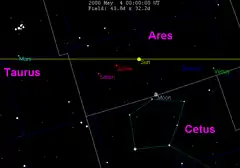2000 in science
The year 2000 in science and technology involved some significant events.
| |||
|---|---|---|---|
Astronomy and space exploration

Conjunction of planets, moon and sun on May 4, 2000
- May 4 – A rare astronomical conjunction occurs on the New Moon including all seven of the traditional celestial bodies known from ancient times until the discovery of Uranus in 1781; this conjunction consists of the Sun and Moon, Mercury, Venus, Mars, Jupiter and Saturn.
- August 10 – Publication of the M-sigma relation in The Astrophysical Journal.
Biology
- June 26 – 'Rough draft' of the human genome is announced jointly by President of the United States Bill Clinton and British Prime Minister Tony Blair.[1]
- December 14 – The full genome sequence of the flowering plant Arabidopsis thaliana is published in Nature.
- 10-year Census of Marine Life launched.[2]
Computer science
- March 4 – Sony Computer Entertainment releases the PlayStation 2 sixth generation home video game console in Japan.
- March 14 – Stephen King's horror story Riding the Bullet is published in e-book format only, the world's first mass-market electronic book.
- September – First system enabling the selection, automatic downloading and storage of serial episodic audio content on PCs and portable devices, origin of the podcast, is launched by early MP3 player manufacturer i2Go.[3][4]
Earth sciences
- March – Iceberg B-15, with a surface area of 11,000 km2 (4,200 sq mi), calves from the Ross Ice Shelf of Antarctica.
- April – Cave of the Crystals discovered at the Naica Mine in Mexico.
Medicine
- January – Douglas Hanahan and Robert Weinberg publish "The Hallmarks of Cancer".[5]
- January 31 – English doctor Harold Shipman is found guilty of killing fifteen of his elderly patients by lethal injections of diamorphine, the only British physician ever convicted of murdering his patients; he is actually considered to have killed at least 215.[6]
Paleontology
- First fossil of Orrorin, an early species of Homininae, discovered in the Tugen Hills of Kenya.
Philosophy
Awards
Deaths
- January 12 – Margaret Hutchinson Rousseau (b. 1910), American chemical engineer
- January 19 – G. Ledyard Stebbins (b. 1906), American botanist and geneticist
- March 7 – W. D. Hamilton (b. 1936), English evolutionary biologist, widely recognised as one of the greatest evolutionary theorists of the 20th century
- March 10 – Nim Chimpsky (b. 1973), chimpanzee
- May 6 – John Clive Ward (b. 1924), English-born physicist
- May 19 – Yevgeny Khrunov (b. 1933), cosmonaut
- June 14 – Elsie Widdowson (b. 1908), English nutritionist
- July 8 – W. David Kingery (b. 1926), American materials scientist specializing in ceramic materials
- July 14 – Sir Mark Oliphant (b. 1901), Australian nuclear physicist
- July 29 – René Favaloro (b. 1923), Argentine cardiac surgeon
- September 20 – Gherman Titov (b. 1935), cosmonaut
- October 4 – Michael Smith (b. 1932), English-born Canadian chemist, 1993 Nobel Prize winner
- November 20 – Nikolay Dollezhal (b. 1899), a key figure in Soviet atomic bomb project and chief designer of nuclear reactors
References
- "White House Press Release". Archived from the original on June 29, 2011. Retrieved August 4, 2011.
- "Census of Marine Life". Retrieved October 10, 2011.
- "I2Go eGo".
- Credeur, Mary Jane (September 10, 2001). "2Go is gone after burning through $7 million". Atlanta Business Chronicle.
- Hanahan Douglas; Weinberg Robert A. (January 2000). "The Hallmarks of Cancer". Cell. 100 (1): 57–70. doi:10.1016/S0092-8674(00)81683-9. PMID 10647931.
- "Harold Shipman: Timeline". BBC News. July 18, 2002. Retrieved August 4, 2011.
This article is issued from Wikipedia. The text is licensed under Creative Commons - Attribution - Sharealike. Additional terms may apply for the media files.